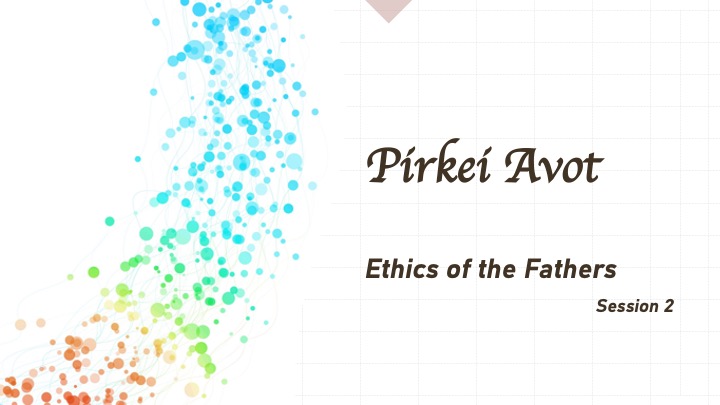Pirkei Avot Lesson 2
Sandy Kress

Ethics of the Fathers – Lesson Plan – Session Two
I. Introduction
II. Verses to Consider and Discuss
A. Yose ben Yoezer used to say: Let your home be a meeting place for the wise and sit in the dust of their feet, and drink in their words with thirst.
Yose ben Yochanan…used to say: Let your home be wide open, and let the poor be members of the household…1:4-5
Questions:
1. What do you suggest was, and now is, the significance of the home?
2. Do you see a possible tension in the priority given the home in the wisdom of each of the Yoses?
3. Why and how should study be emphasized? Why and how should hospitality be emphasized?
B. Yehoshua ben Perachyah says: Accept upon yourself a teacher and acquire for yourself a friend. Judge every person favorably.
Nittai of Arbel says: Distance yourself from a bad neighbor, and do not associate with a wicked person. 1:6-7
Questions:
1. Why is having a teacher and a friend so important?
2. Why is the sage saying we should “accept upon” ourselves a teacher and “acquire” a friend?
3. How can one judge every person favorably while distancing oneself from a bad neighbor and avoiding associating with a wicked person?
4. In other words, do we judge others, or do we not? Or does it depend? How?
C. B. Yehudah ben Tabbai says: (When serving as a judge,) do not act as a lawyer; while the litigants are before you, consider them both as guilty; but when they are dismissed for you, consider them both as innocent, provided they have accepted the judgment.
Shimon ben Shatach says: Interrogate the witnesses extensively; yet be cautious with your words, lest they learn from them to lie. 1:8-9
Questions:
1. These two pieces of wisdom contain several calls for procedural justice. Can you identify them and describe why each is important to ultimate justice?
2. How can you take Yehudah’s wisdom out of the courtroom and apply it in the work of self-judgment?
3. Looking at Shimon’s advice, explain how a judge could use words that might induce a party to lie?
D. Shemaya says: Love work; despise positions of power; and do not become overly familiar with government. 1:10
Questions:
1. We get that work is important, but, why love work? All work? Indeed, what does it mean to love work?
2. a. Why should we despise positions of power, and why should we not become overly familiar with government?
b. What if we could help make lives better for people by doing so? How might we still even then see and follow wise caution in this advice?
3. Why do you think the sage pairs love of work with cautions about getting too close to government?
III. Conclusion – what are our takeaways from study today?